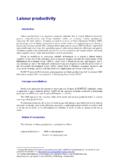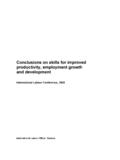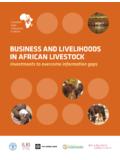Transcription of BOOSTING PRODUCTIVITY AND INCLUSIVE GROWTH IN …
1 OECD Latin America & the CaribbeanRegional ProgrammeBoosting PRODUCTIVITY and INCLUSIVE GROWTH in Latin America BOOSTING PRODUCTIVITY AND INCLUSIVE GROWTH IN LATIN AMERICABOOSTING PRODUCTIVITY AND INCLUSIVE GROWTH IN LATIN AMERICAThis publication was developed by the OECD and the IDB, in collaboration with the OECD Global Forum on PRODUCTIVITY , to support the discussions of the OECD Latin America and the Caribbean Regional Programme s Ministerial Meeting on PRODUCTIVITY and INCLUSIVE GROWTH , which took place from 5-6 December 2016 in Santiago, Chile. The OECD and IDB analysis included in this publication highlights that to reignite GROWTH and keep the momentum of social progress, governments in Latin America must focus on BOOSTING PRODUCTIVITY through the empowerment of all workers with skills and technology and the unleashing of innovation and entrepreneurial dynamism.
2 The publication portrays the situation of many Latin American countries and discusses best practices. It informs the debate on future trends in Latin America towards higher PRODUCTIVITY and more INCLUSIVE GROWTH . Launched at the OECD s 2016 Ministerial Council Meeting by OECD Secretary General Angel Gurr a and the President of Chile, Michelle Bachelet, the OECD LAC Regional Programme aims to support the region in advancing its reform agenda along three key priorities: increasing PRODUCTIVITY , advancing social inclusion, and strengthening institutions and governance. For each of these priorities, the Programme, in partnership with regional international organisations, works to deliver greater availability of comparable statistics; the preparation of policy assessments; policy dialogue at a high and technical level; and support for implementation with policy advice tailored to specific needs of countries or sub-regional contexts.
3 The Global Forum on PRODUCTIVITY (GFP) was launched by the OECD in 2015 to foster international co-operation between public bodies with responsibility for promoting PRODUCTIVITY -enhancing policies. The GFP is a platform where participants convene to exchange information and data, discuss best practices and frontier-research findings, and undertake joint PRODUCTIVITY analysis. The work programme of the GFP is guided by a Steering Committee of countries and supported by the work of the OECD Secretariat. BOOSTING PRODUCTIVITY AND INCLUSIVE GROWTH IN LATIN AMERICA 2 This document has been drafted under the responsibility of the Secretary General of the OECD, and in collaboration with the Research Department from the Inter-American Development Bank. The opinions expressed and arguments employed herein do not necessarily reflect the official views of both organizations or of the governments of its member and partner countries.
4 This document and any map included herein are without prejudice to the status of or sovereignty over any territory, to the delimitation of international frontiers and boundaries and to the name of any territory, city or area. The statistical data for Israel are supplied by and under the responsibility of the relevant Israeli authorities. The use of such data by the OECD is without prejudice to the status of the Golan Heights, East Jerusalem and Israeli settlements in the West Bank under the terms of international law. You can copy, download or print OECD content for your own use, and you can include excerpts from OECD publications, databases and multimedia products in your own documents, presentations, blogs, websites and teaching materials, provided that suitable acknowledgment of OECD as source and copyright owner is given.
5 All requests for public or commercial use and translation rights should be submitted to Requests for permission to photocopy portions of this material for public or commercial use shall be addressed directly to the Copyright Clearance Center (CCC) at or the Centre fran ais d exploitation du droit de copie (CFC) at FOREWORD 3 PROLOGUE The Challenge of PRODUCTIVITY and Inclusiveness in Latin America Eight years have passed since the beginning of the so-called Great Recession and the international economic scenario continues to be complex. The modest economic GROWTH of developed countries was followed by a slowdown in the economic performance of most developing countries. Latin America is no exception. The Chinese hard landing has had a negative impact on the price of commodities, affecting both our exports and tax revenues.
6 As a result, the economic scenario we are facing as a region is significantly less favorable than earlier times. However, the post-crisis cyclic context has not been the only relevant factor in the scenario of international economy. From the beginning of the last decade, most OECD countries have presented a downturn on PRODUCTIVITY GROWTH and a setback in terms of income distribution, with the richest 10% of the population earning, on average, 10 times more than 10% of those with lower income. These challenges are not foreign to the landscape faced by Latin America. PRODUCTIVITY and inclusiveness are, precisely, part of the most critical challenges that we must face as a region. PRODUCTIVITY is one of the determining factors of high and sustained GROWTH . For that purpose, it is essential to design and implement good policies that increase competitiveness among our smaller-sized enterprises, foster diversification and sophistication of the productive structure of our economies and promote the democratization of entrepreneurship and innovation opportunities.
7 In this manner, we will contribute to the reduction of inequality and increase our citizens well-being. This was Chile s premise when leading for the first time the OECD s 2016 Ministerial Meeting. As the host country and under the leadership of President Michelle Bachelet, Chile proposed as the main topic of this meeting the nexus between PRODUCTIVITY and inclusiveness. In doing so, we aim to expand the analysis and debate regarding these variables and the relationship that emerges between them, thus inviting to boost the relevance and visibility of PRODUCTIVITY and inclusion as the main objectives for public policies. This effort is, precisely, a direct reflection of what has been happening in Chile during the last few years. The launch and implementation of the Chilean Government s PRODUCTIVITY Agenda 2014-2018, followed by the announcement of 2016 as the Year of PRODUCTIVITY show the high level of priority and commitment that Chile has concerning these matters.
8 With this in mind, and in collaborative work with the Organization for Economic Cooperation and Development (OECD) and the Inter-American Development Bank (IDB), we want to take this discussion to our region and propose the goal of increasing PRODUCTIVITY and inclusiveness as a central part of a collaborative work between our countries. This document, together with the 2016 Ministerial meeting for PRODUCTIVITY and INCLUSIVE GROWTH hosted in Santiago, Chile, are a great opportunity for that. We trust that this dialogue will be the first step towards a continuous work that will allow us to create more and better opportunities for our citizens. Luis Felipe C spedes Chilean Minister of Economy, Development and Tourism FOREWORD 4 FOREWORD Over the past two decades, most Latin American and Caribbean (LAC) countries have experienced robust economic GROWTH , with the region expanding at a pace exceeding 3% annually.
9 This strong performance was largely the result of high commodity prices, sound macroeconomic policies, innovative social policies and structural reforms. In this supportive environment, countries were able to make GROWTH more INCLUSIVE , with significant reductions in extreme poverty and income inequality, while social protection, education and health services improved. However, GROWTH in the region has gradually slowed since 2012 to eventually turn negative in 2015, with preliminary estimates for 2016 suggesting a similar pattern. Even before the recent slowdown, GROWTH in the LAC region was not strong enough to converge towards levels of per capita income observed in advanced OECD economies. An important part of this underperformance can be explained by differences in the dynamism of PRODUCTIVITY between LAC and more advanced economies.
10 Weak PRODUCTIVITY , should it persist, will make it very difficult to achieve better lives for the majority of Latin American families. In addition, many citizens lack access to public services of high quality. Helping working families with better technical and vocational education, better access to health care and better labour-market policies will spread the benefits of enhanced PRODUCTIVITY by bringing everyone on board. To reignite GROWTH and keep the momentum of social progress, we firmly believe that governments must focus on BOOSTING PRODUCTIVITY through the empowerment of all workers and the unleashing of innovation and entrepreneurial dynamism. In this respect, the business sector can be a strategic partner in the pursuit of INCLUSIVE PRODUCTIVITY , with the ability to have a profound impact on the well-being of workers while improving firms financial performance.















